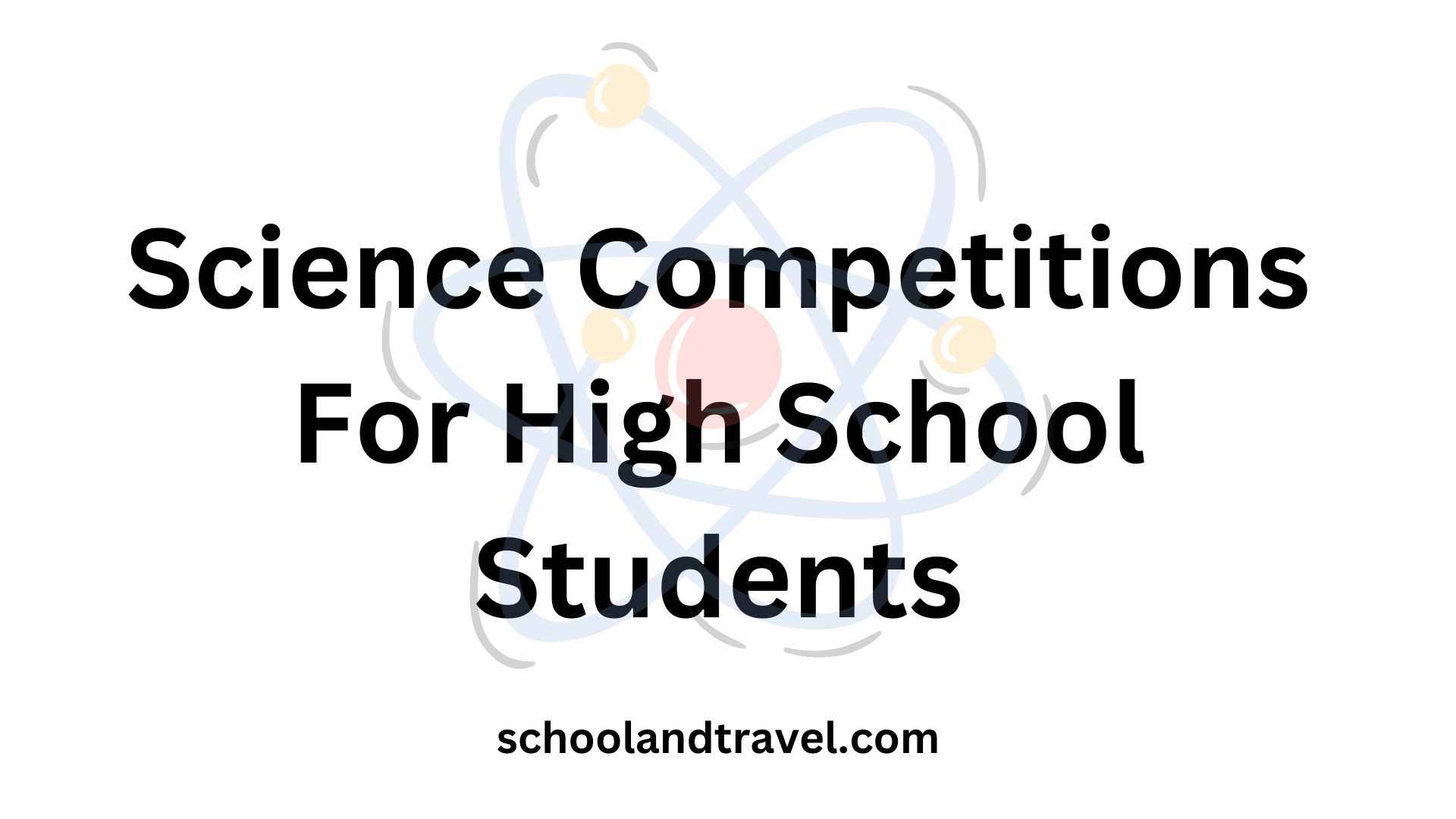Science competitions provide an exciting platform for high school students to showcase their passion for scientific exploration and innovation.
These competitions offer more than just a chance to win prizes; they foster critical thinking skills, scientific knowledge, and hands-on experience.
This article will explore the world of science competitions for high school students, highlighting their benefits, popular competitions, preparation strategies, available resources, and inspiring success stories.
Whether students are interested in biology, chemistry, physics, or any other scientific field, participating in these competitions can be a transformative experience, igniting a lifelong love for science and opening doors to future academic and career opportunities.
Benefits of Science Competitions for High School
Participating in science competitions offers numerous benefits for high school students, both academically and personally.
Here are some key advantages of engaging in these competitions:
1. Enhancing Scientific Knowledge
Science competitions allow one to delve deeper into scientific concepts beyond the classroom curriculum.
Students can explore advanced topics, conduct research, and better understand their chosen scientific field.
2. Developing Critical Thinking Skills
Science competitions foster critical thinking and problem-solving abilities.
Students are challenged to analyze complex problems, design experiments, and find innovative solutions.
These experiences enhance their analytical skills, creativity, and ability to think outside the box.
3. Building Practical Skills
Science competitions often involve hands-on experiments, data analysis, and presentation of findings.
Students develop practical skills such as laboratory techniques, data interpretation, scientific writing, and oral communication through these activities.
4. Gaining Recognition and Scholarships
Achievements in science competitions can enhance a student’s academic profile and attract the attention of colleges and universities.
Winning or performing well in prestigious competitions may also open doors to scholarships, grants, and research opportunities.
5. Networking and Mentorship
Science competitions provide a platform for students to meet with peers who share their passion for science.
They can collaborate, exchange ideas, and build lasting relationships.
Additionally, students may interact with mentors, scientists, and industry professionals who can offer guidance and support in their scientific pursuits.
6. Building Confidence
Successfully participating in science competitions boosts students’ self-confidence.
Presenting their research or projects to judges and peers helps them develop practical communication skills and overcome stage fright.
7. Exploring Career Pathways
Science competitions expose students to various scientific disciplines and real-world challenges.
This exposure can inspire them to consider career paths they may not have previously considered, such as scientific research, engineering, medicine, or environmental sciences.
Popular Science Competitions for High School Students
Several popular science competitions offer high school students the platform to showcase their scientific knowledge and skills.
Here are some noteworthy science competitions that attract participants from around the world:
1. Intel International Science and Engineering Fair (ISEF)
ISEF is one of the most prestigious science competitions.
It brings together top young scientists from over 75 countries to compete for scholarships, grants, and recognition.
Participants present their research across various scientific disciplines and have the chance to interact with leading scientists and industry professionals.
2. Regeneron Science Talent Search (STS)
STS is a renowned competition that focuses on original scientific research.
It invites high school seniors to submit their research projects for evaluation.
Finalists can present their work to esteemed judges and compete for scholarships and national recognition.
3. Google Science Fair
Google Science Fair is a global online competition that encourages students to explore scientific questions and present their findings in innovative ways.
Participants compete for prizes and scholarships while gaining exposure to a worldwide audience.
4. Siemens Competition in Math, Science, and Technology
This competition recognizes outstanding achievements in math, science, and technology.
It offers significant scholarship opportunities for individual and team projects and encourages students to pursue scientific research in their fields of interest.
5. Science Olympiad
Science Olympiad is a team-based competition focusing on various science disciplines, including biology, chemistry, physics, and engineering.
Students participate in hands-on events and compete against other schools or regions. Science Olympiad fosters teamwork, problem-solving skills, and a love for science.
6. Junior Science and Humanities Symposia (JSHS)
JSHS is a program that promotes original research and experimentation in science, technology, engineering, and mathematics (STEM) among high school students.
It provides a platform for students to present their research and engage in scientific discussions.
7. Science Bowl
Science Bowl is a fast-paced academic competition where teams of students compete in answering questions across various science disciplines, including biology, chemistry, physics, and earth science.
The U.S. Department of Energy organizes the competition and encourages students to develop their knowledge and critical thinking skills.
8. FIRST Robotics Competition
FIRST Robotics Competition combines sports’ excitement with science and technology’s rigors.
Students work in teams to design, build, and program robots to compete in an annual game.
The competition emphasizes teamwork, innovation, and problem-solving.
9. BioGENEius Challenge
The BioGENEius Challenge focuses specifically on biotechnology research.
High school students are invited to submit original research projects in the biotechnology field for evaluation.
Finalists can present their projects to a panel of experts and compete for scholarships and industry recognition.
10. National Science Bee
The National Science Bee is a buzzer-based academic competition that tests students’ knowledge in various science disciplines, including biology, chemistry, physics, earth science, and astronomy.
The competition format resembles a quiz show, and participants compete individually or in teams.
11. Conrad Challenge
The Conrad Challenge is an innovation competition encouraging students to develop technological solutions to real-world problems.
Students form teams and work on projects that align with specific challenge categories such as aerospace, energy, cybersecurity, and health.
Frequently Asked Questions: Science Competitions For High School Students
No, science competitions are open to all high school students, regardless of their career aspirations.
While these competitions offer valuable opportunities for students interested in science, technology, engineering, and mathematics (STEM) fields, they also promote critical thinking, problem-solving, teamwork, and communication skills that are beneficial in any field of study.
Participating in science competitions can enhance students’ academic and career paths in several ways.
It allows students to deepen their understanding of scientific concepts, develop research and experimental skills, and gain hands-on experience in their areas of interest.
Furthermore, winning or placing in prestigious competitions can boost college applications, attract scholarship opportunities, and provide networking connections with professionals in the field.
The costs associated with science competitions vary depending on the specific competition.
Some competitions have registration fees, while others may require students to cover travel expenses.
However, many organizations offer financial aid or sponsorship opportunities to ensure accessibility for students from diverse backgrounds.
Researching the competition’s website or contacting the organizers for specific details regarding costs and available support is advisable.
Science competitions offer both individual and team participation options.
Some competitions focus on individual performance, where students compete against their peers.
Others emphasize collaborative teamwork, allowing students to work together to solve problems or complete projects.
The choice between individual or team participation often depends on the competition’s format and objectives.
To prepare for science competitions, students can start by identifying their areas of interest and selecting competitions aligned with those interests.
They can study relevant scientific concepts, research previous competition topics, and practice problem-solving skills.
It’s also beneficial to seek guidance from teachers or mentors, join science clubs or programs, and engage in hands-on experiments or projects to gain practical experience.
Many competitions provide study resources, sample questions, and practice tests to help students prepare effectively.
Conclusion
Participating in science competitions can be a transformative journey for high school students, empowering them with invaluable skills and experiences.
The benefits of engaging in these competitions extend far beyond trophies and recognition.
Students develop critical thinking, problem-solving, and communication skills by immersing themselves in scientific exploration.
They gain exposure to real-world challenges, expand their scientific knowledge, and forge connections with like-minded individuals and mentors.




